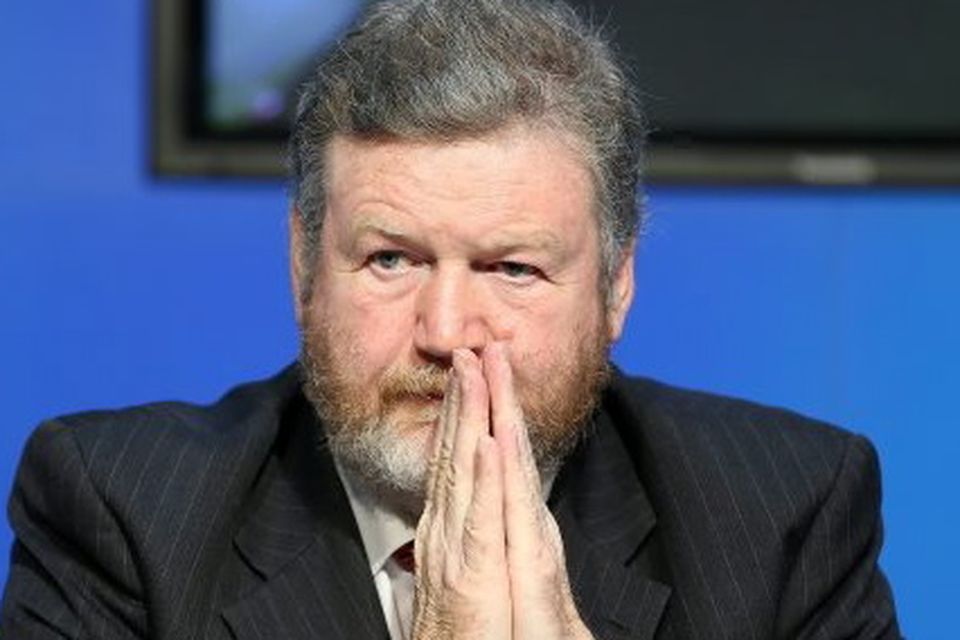James Reilly ignored HSE chief's dire warnings
Correspondence reveals deep divisions at the very top of the health service in the countdown to last year's Budget
James Reilly
Health Service Executive Director General (HSE) Tony O'Brien privately warned the Government that the 2014 budget and service plan for the health service was "unsafe and unrealistic".
His hard-hitting comments are contained in explosive new correspondence obtained by the Sunday Independent, which reveal for the first time the full scale of the divisions at the very top of the health sector in the weeks and months leading up to last year's Budget.
Mr O'Brien flatly told the then health minister James Reilly and the now departed Secretary General of the Department of Health, Ambrose McLoughlin, that the cuts they were seeking posed a real risk to patient safety.
In his correspondence - dating between September and December last - Mr O'Brien repeatedly warned he had "a number of serious issues" with the level of savings the Government was demanding.
The documents show Mr O'Brien and the HSE were effectively blindsided by the Government about the level of savings it was expected to deliver in the Budget.
The HSE chief wrote: "Budget 2014 reduced our Vote by €341m. There is an incoming deficit of €419m which coupled with a savings target of €666m brings the actual savings challenge to in excess of €1bn. This is a considerably more challenging position than we would have anticipated prior to the Budget."
As a result, Mr O'Brien, in submitting the final HSE plan to Government, made it clear he felt many of the targeted savings were not achievable.
"Patient safety and improving service quality is a central theme of the HSE. Unfortunately, these objectives are not fully supported by elements of the plan which have been included solely with our obligation to remain consistent with saving measures described," he wrote.
"At most, even with the withdrawal of up to 225,000 medical cards, a figure which seems improbable on probity grounds alone, the maximum realisable saving is in the order of €44m.
"Achievement of the full savings is not in our view achievable without significant policy changes." However, Mr O'Brien's stark warning fell on deaf ears. In a letter dated October 30, Dr Reilly, said the "very ambitious savings targets must be met" in spite of Mr O'Brien's concerns.
In another letter to Mr O'Brien on Dec 13 Dr Reilly repeatedly ordered the HSE chief to remove some of the more critical language about the plan's failings and replace it with more favourable commentary.
Several times in his letter, Dr Reilly orders Mr O'Brien to "replace and amend" paragraphs and tables included in the draft service plan with more acceptable language.
"Sections on page 10 needs amendment while references to independent trusts in the community should be removed," Dr Reilly wrote.
Writing to Dr Reilly on November 25, Mr O'Brien also said the €113m in medical card probity savings announced on Budget day last October were included "against the explicit advice of the HSE and the Department of Health".
This revelation will heap pressure on Public Expenditure Minister Brendan Howlin, who demanded the cuts despite Mr O'Brien's warning.
On top of the medical card probity savings dispute, Mr O'Brien argued that the €108m in anticipated payroll savings demanded by Mr Howlin were "not deliverable". He also said as far back as last November that €80m of savings demanded by Mr Howlin under the Haddington Road Agreement were not realistic.
"These build in an overall risk of a full year deficit of in excess of €450m," Mr O'Brien said. However, Mr McLoughlin responded to Mr O'Brien saying the HSE plan "must fully accord with the policies and objectives of the Minister and Government" given the €13.3bn set for the sector and the saving measures needed to remain within budget.
In his November 25 letter, Mr O'Brien stated that the HSE had to divert €125m of funding earmarked for the paying of pension lump sums for retiring staff in order to help address the funding crisis.
He had warned in September that the HSE would need an extra €545m in 2014 in order to deliver a safe service. Last week, it was reported that current Health Minister Leo Varadkar is looking for €500m in next month's Budget to allow him to push through reforms and to finally balance the books in the health service.
"The focus on financial performance has tended to overshadow the necessary and pre-eminent focus that must apply to quality and safety," Mr O'Brien wrote.
Mr O'Brien also said the Department and the HSE needed to "re-evaluate the value of arbitrary approaches to employment control" which he said was negatively impacting on patient care. Public Accounts Committee chairman John McGuinness, who ordered the release of the documents to the committee, described the contents of the correspondence as "shocking".
He told the Sunday Independent: "The correspondence shows how dysfunctional the whole system is. The figures imposed on the HSE were neither realistic or safe."
He said the revelations will be raised at this Thursday's meeting of the committee, but was deeply critical of the departments of health and public expenditure and reform.
"Both departments are in complete denial there is a lack of political will to face up to the problems that are there. There is a danger in hospitals because of all of this."
Join the Irish Independent WhatsApp channel
Stay up to date with all the latest news














